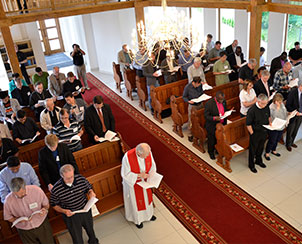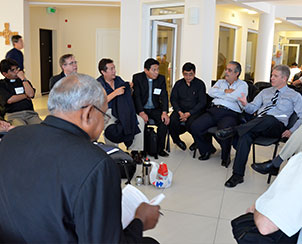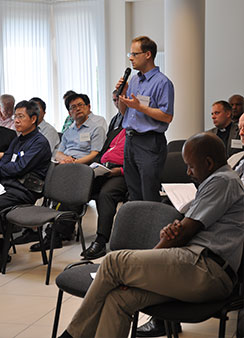By Pamela Nielsen
At Palanga, Lithuania — a site of extreme persecution against Lutherans during the Stalinist era — leaders of church bodies and seminaries around the world gathered Aug. 8-11 for the International Lutheran Council’s (ILC) Fifth World Seminaries Conference to explore the theme of “Suffering, persecution and martyrdom as a mark of the church.”

Representing member church bodies of the ILC, 76 participants came from every continent except Antarctica to attend the conference hosted locally by Rev. Dr. Darius Petkunas, a professor at Helsinki University; the congregation of Palanga Lutheran Church; and the Evangelical Lutheran Church of Lithuania.
The ILC is a worldwide association of confessional Lutheran church bodies.
In opening remarks, the Rev. Dr. Albert B. Collver III, who is ILC secretary and director of Church Relations for the LCMS, reflected on the conference theme.
“Ironically, the more the church prays to be a witness to the world, the more likely the church is to experience the cross and suffering, which in itself becomes a witness,” Collver told participants.
He noted that the theme of suffering, persecution and martyrdom has been a topic of theological reflection since the time chronicled in the Book of Acts.
“At the beginning of the second decade of the 21st century, the church has passed through a century where more Christians numerically have been persecuted and martyred than at any other time in history,” he continued. “At the same time, Islam is spreading among peoples and through lands where the Gospel once held sway. If the external threats of secular humanism and Islam were not enough, the church is under attack from within,” said Collver.
Bishop Mindaugas Sabutis of the Evangelical Lutheran Church of Lithuania, a member church of the Lutheran World Federation, also greeted the group, which met at the Palanga Lutheran Church and Diaconal Center. He noted that for Christians in Lithuania, persecution in one form or another has been nearly constant throughout the past 400 years.
Conference speakers addressed facets of the conference theme.
The Rev. Dr. William Weinrich, professor of Church History at Concordia Theological Seminary, Fort Wayne, Ind., provided the keynote address, setting the stage for deep reflection. His presentation titled “A historical view of martyrdom and the cross” explored suffering, persecution and martyrdom in the early-church era.
Underscoring the relevance of the topic for today, Weinrich noted that credible research estimates that more than 100,000 Christians are violently killed because of some relation to their faith each year; others are either displaced, see their churches destroyed or experience the abduction of their leaders.
“As we think about the present circumstances of our Lutheran churches in the world and about how best to prepare our people for further suffering,” Weinrich explained, “we should not forget the great resource we have in the Sacrament of the Altar. For it is not merely that which ‘strengthens’ faith, but is itself the reality of life over death.” He then quoted John 6:54 — “whoever eats my flesh and drinks my blood has eternal life, and I shall raise him on the last day.”
Petkunas, a member of the faculty of Theology at the University of Helsinki, continued the discussion with his topic, “A further historical reflection of martyrdom and the cross,” which included findings from his extensive research into the Marxist-Leninist era persecutions of the 20th century.

“The life of the church has been marked from the beginning by the presence of the cross, that particular form of suffering borne by those who confess the name of Christ,” said Petkunas. “Marxist-Leninist communism clearly stated that for communism to succeed, the church and its superstitions must be destroyed and that the very idea of God must be erased from man’s heart and soul. … By the mid 1930s, the Roman Catholic and Lutheran churches in Soviet Russia had disappeared from the scene.”
Petkunas reminded conference participants that the seven marks of the church, as outlined by Martin Luther, provide a way to know that the true church is present.
He explained, “The seventh sign has always been regarded as a secondary mark of the church. Its absence at a particular time and at a particular place does not necessarily mean that the church is no longer the true church. However, it often happens that where the church is unwilling to bear the pain of the cross, other marks and signs of the church, including the pure proclamation of the Gospel, the right administration of the Sacraments and the proper ordering of the Holy Ministry disappear, as well.”
Responding to Petkunas’ presentation, the Rev. Alexey Streltsov, rector of Lutheran Theological Seminary, Novosibirsk, Siberia, reflected on the nature and shape of suffering.
“In secular culture,” he said, “suffering is viewed as something to get over. … No, when suffering comes it is not something to get over; it may never go away, it may only increase.”
“Around us [today] it doesn’t look like things will get better. This history of the martyrs will help prepare us for what is to come,” Streltsov concluded.
The Rev. Roberto Bustamante, New Testament professor at Seminario
Concordia, Buenos Aires, Argentina, provided “The exegetical view of martyrdom and the cross.”
“The church participates in Christ’s storied-with-suffering body through sacramental mediation,” Bustamante said. “For it is the water and blood that sprang out of the Crucified’s side, at the precise moment when the church was being founded, with which we are baptized into His death and resurrection, into that storied-with-suffering body and are given a share in that one suffering and risen body, in spite of us being many.”

Examining the theme through the Lutheran Confessions, the Rev. Dr. Lawrence Rast, president of Concordia Theological Seminary, Fort Wayne, noted that Martin Luther had consistently expected to die during the great part of his adult life — either from bad health or at the hand of his antagonists. His death in 1546 was from natural causes.
“Shortly after [Luther’s] death,” Rast explained, “martyrdom and the cross came upon his followers through the efforts of Moritz of Saxony and Charles the V.”
Exploration of the conference theme culminated in the paper titled “A practical view of martyrdom and the cross,” presented by the Right Rev. Dr. Joseph Ochola Omolo, bishop of the Evangelical Lutheran Church of Kenya Lake Diocese and rector of Matongo Lutheran Theological College, Kenya.
Speaking from the present-day experience of African Christians, Omolo said, “When persecution comes, the devil believes he can eliminate the church. And God, according to His foreknowledge, knows it will happen. But He intends that it will be a blessing for the church.”
Omolo described several enemies of the church, including traditional cultural religiosities, political oppressors, Muslim jihadists, the liberal wing of Christianity, the new Pentecostalism with a health-and-wealth theology of glory, and postmodern ideology.
“The church must be aware of her enemies to make her stand firm, ready with Word and Sacrament and proper proclamation of the Gospel,” said Omolo. “For all these challenges, within and without this context, the Lutheran theology of the cross is the answer.”
Grouped according to world regions, participants devoted an afternoon to discussing particular challenges and opportunities facing Lutheran seminary education worldwide. Common challenges they identified are the need for seminary faculty with advanced degrees in theology, achieving accreditation standards and strengthening theological libraries.
Presentations on the LCMS Global Seminary Initiative (GSI) and the related Chemnitz Library Project were enthusiastically received. Being assured that solid training and formation of faithful pastors is the key to Lutheran mission efforts and healthy congregations, participants expressed their willingness to work together as partners, learn from each other and share resources to strengthen seminary education worldwide.
The GSI is an effort by the LCMS — overwhelmingly approved at this summer’s Synod convention — designed to work in partnership with Lutheran seminaries across the globe to provide advanced theological education through exchange of students and faculty members.
A conference presentation about the Wittenberg Project — the effort to restore a 16th century school building in the heart of Wittenberg, Germany, as a center for confessional Lutheran outreach, scholarship and tourism — was received with great interest and support.
Daily worship services were led and planned by conference chaplain Rev. Dr. Timothy Quill, who is LCMS director for Global Seminary Education, as well as associate professor of Pastoral Ministry and Missions and dean of International Studies at Concordia Theological Seminary, Fort Wayne. Each day’s worship added another perspective to the conference theme as it included the commemoration of martyrs throughout history, such as the commemoration of the first Lutheran martyrs — Heinrich Voes and Johann Esch, who were burned alive on July 1, 1523.
Participants also enjoyed several opportunities to experience local culture and become acquainted over meals and evening receptions.
Many of them expressed surprise at the reality that the confessing Lutheran church exists in so many places in the world. For instance, church leaders representing Lutherans in a country with only one or two parishes said they were encouraged by the unity of faith among those attending.
Participants also shared their gratitude for the opportunity to attend such a conference and to be part of the International Lutheran Council, which exists for the purpose of encouraging, strengthening and promoting confessional Lutheran theology and practice centering in Jesus Christ, both among member churches and throughout the world.
As the conference concluded, the executive committee of the ILC announced that Wittenberg, Germany, would be the location for the next World Seminaries Conference in 2016.
Deaconess Pamela Nielsen is associate executive director for LCMS Communications.




Greetings:
Thank you for the excellent report on the Conference.
One observation: the next Conference location is still to be defined by the Seminary Relations Committee and by the ILC Executive Committee. Wittenberg was presented as one of the possibilities, a very good possibility indeed, given the fact that the Conference will happen one year before the celebration of 500 years of Reformation.
Blessings,
Gerson L. Linden
Seminary Relations Committee
Thank you so much for this article! It was extremely interesting. I do so hope that I might be able to attend (even at my own expense, if necessary!) the 2016 in Wittenberg, Germany! That will surely be awesome. (posted from Nairobi, Kenya, East Africa)
But what are we Lutherans DOING to help the persecuted church around the world? Prayer, yes. But what about helping the pastors and families of those persecuted? They may need food and shelter while their loved ones are in prison or put to death for the Faith.